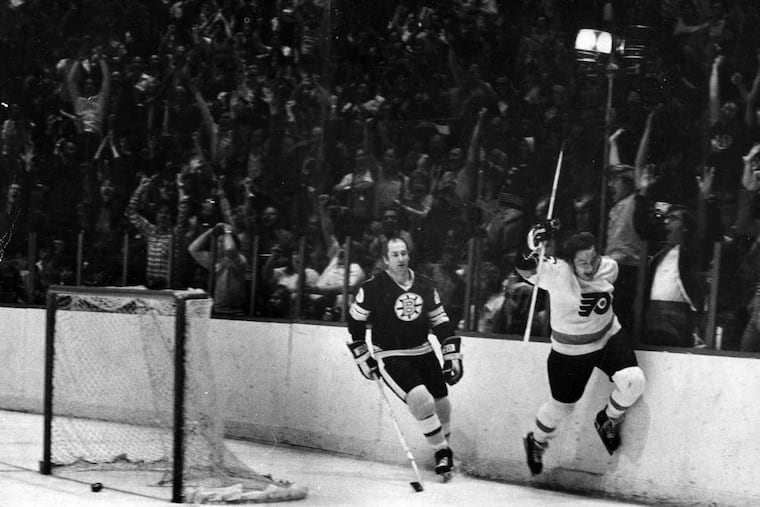Flyers playoff flashback: Reggie Leach’s NHL-record 5 goals in 1976 win over Boston Bruins almost didn’t happen
Leach was almost benched in a 1976 playoff game, but his best friend, Bobby Clarke, talked coach Fred Shero into playing him.

First in a series counting down the 10 most memorable playoff wins in the Flyers’ history.
Today: No. 10.
Reggie Leach made NHL history on May 6, 1976, but if it weren’t for his good buddy, Bobby Clarke, he probably would have been kept out of the lineup that night by Flyers coach Fred Shero.
Known as Reggie the Rifle because of his blazing shot, Leach equaled an NHL playoff record by scoring five goals in that Game 5 of the Stanley Cup semifinals at the Spectrum.
The record still stands and is now shared with three players over the last century: Montreal’s Maurice “Rocket” Richard (1944), Toronto’s Darryl Sittler (1976), and Pittsburgh’s Mario Lemieux (1989).
Leach triggered the 6-3 win over Boston, which pushed the Flyers into the Finals for the third straight season.
“I had a lot of shots, a lot of opportunities,” Leach, 70, said recently from his home on Manitoulin Island in northern Ontario. “I probably could have had seven or eight of them that night. It was just one of those games where I was in the right place at the right time.”
Leach, who had a league-leading 61 goals in that regular season, had a blistering shot, but in that game, “I got three goals on backhands,” he said. “I know I had a good backhand, but to get three goals in one game that way, that’s something else.”
He called it a “once-in-a-lifetime game where everything clicked. I had my confidence that year and nothing was going to stop me.”
During practice the day before that game, Leach got into an argument with an assistant coach. He later left the team’s hotel in Valley Forge and headed to his Cherry Hill home.
“I probably could have had seven or eight of them that night. It was just one of those games where I was in the right place at the right time.”
Shero, who Leach said wasn’t part of the argument, wasn’t happy. He strongly considered benching Leach in Game 5, even though he was lighting it up in the playoffs, including goals in his last eight games.
It didn’t help Leach’s cause that he reportedly had too much to drink and wasn’t at the morning skate the next day.
Enter Clarke, who went to Shero and spoke on Leach’s behalf.
“We still talk about that to this day,” said Leach, who has said Clarke, his former linemate during their junior hockey days, will “always be my best friend.”
Clarke said he doesn’t recall what he said to Shero, but Bill Barber, a star left winger on that team, said the captain’s words were appreciated by his teammates.
“From a stability standpoint, we needed Reggie in the lineup, and Clarkie was a great team player. He cared for all his teammates,” Barber recalled last month. “Being captain, he did the right thing by approaching the staff and saying, ‘Hey, he’s not going to be a disappointment.’ And he wasn’t, obviously.”
After Leach helped dispose of the Bruins, the two-time defending Stanley Cup champion Flyers lost in four straight to Montreal in the 1976 Finals, dropping the first three games by one goal and losing in Game 4, 5-3, in a contest that was tied at 3-all with less than six minutes left.
The Flyers were without injured stars Bernie Parent and Rick MacLeish in that Finals, and talented right winger Gary Dornhoefer played but was hobbled and was not himself.
The injuries and the long grind from deep playoff runs in the previous three seasons, Barber said, took its toll as the Canadiens won their first of four straight Cups.
“It was a lot of hockey that we played,” Barber said. “I know it wasn’t at the same pace of today, but still we were beat up a little bit. I’m not using it as an excuse. Give Montreal credit. They had a great team and they started their dynasty that year. But if we would have had our true team together and been rested, it would have been a hell of a lot better series.”
“Everybody thinks it was a cakewalk because they beat us in four straight,” said Leach, who had four goals in that Finals, “but it was a tight series. And you take away Ricky MacLeish and Bernie Parent, it would be like taking Ken Dryden and Guy Lafleur out of their lineup. But that’s the way hockey goes. We had a good run.”
Leach, who now runs hockey camps with his son, Jamie, and teaches lessons about drugs and alcohol to youngsters, won the Conn Smythe Trophy as the best player in the playoffs that season. He scored an NHL playoff-record 19 goals in 16 games, giving him a staggering 80 goals, combined, in the regular season and playoffs.
“For myself, winning the Conn Smythe at that moment wasn’t [special] because we had just lost out,” Leach said, “but when you look at it later, I’m the only forward to ever win the Conn Smythe on a losing hockey team.”
Without Clarke stepping in and pleading his case to Shero, it might never have happened.